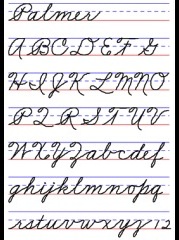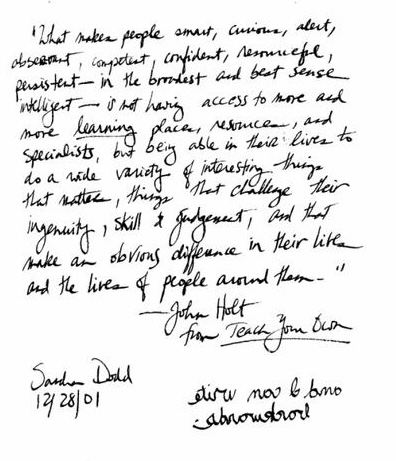Cursive, unschooling, change, musings
From a discussion on AlwaysLearning
Someone asked this question:
What is your take on the necessity of cursive writing. Do kids really
need to learn it?
Sandra:
My granny was sure, in the the 60's, that my life would be incomplete
because I was learning to write with pencil and ballpoint instead of
a fountain pen.
I did okay. And because of personal interest, I did a lot of writing
with fountain pens, cartridge pens and dip pens.
My husband's cursive writing is unuseable for everyday purposes. I
know one young man in his 20's who went to school "regularly" and
can't read cursive writing very well at all. He can't be the only one.
I think it's fading.
SandraDodd.com/writing
It does seem that "keyboarding" (once known as typing) is the
important skill to have.
Even if I thought cursive was a necessity for life, though, trying to
make people do it wouldn't be a good way to get there.
Kirby's handwriting improved a lot after he went to work at a pizza
place and took phone orders that other people needed to be able to
read. It was his first real use of quick handwriting. Some people
never find a real-world need for it.
Sandra
My brother is 35 years old. He does not write cursive. He prints
everything. In fact, he even prints his signature. He went through
grade school, high school (strict Catholic college prep school), and
college without writing cursive. He is now working in the corporate
world as a project manager. It did not inhibit him in the least.
Deanne
Regarding cursive, someone said to me:
I think it's important that children understand that there are
standards that need to be met.
If they never experience stress, they won't be able to handle stress
later. In the real world, people are tested & stressed out daily. If
you can't handle it, you get fired.
I was speechless...
Flyerkat
Diana Jenner wrote:
When talking to regional homeschoolers recently, one went on and on about "forcing" her child to write, as it was soooo important to have good handwriting... I shared with her that Stephen King writes longhand and has a hard time finding people to decipher it - but it hasn't stopped him from making millions thru his passion. I added, I hope you don't "handwriting" his novel out of him.🙂
Marji wrote:
Neither has poor handwriting hurt physicians' ability to succeed! BTW, didja hear the one about the doctors' strike at the local hospital? They had to call in pharmacists to read the picket signs! (rim shot here)
Annie Regan, April 2022:
Hi Sandra
I wanted to share a story about writing with you, happy for you to add it to your collection.
My 17 year old has been writing since she was 8 or 9 (well, she was writing stories before that and dictating them to me, but writing things down on paper since then. She figured out how to do all the letters herself and while I've been able to read it, it's never looked like 'school' writing. Some of her schooled friends used to laugh at the way she wrote (she didn't have that convention of things like 'g' having the loop below the line for example) but it didn't ever bother her enough to change anything, and if she needed to be neat she would use her phone or a computer. She has had 2 jobs in hospitality - one of her bosses was scathing about her writing and she didn't stay in that job. As a waitress in a fine dining restaurant she's worked out a shorthand to be able to take orders quickly and in a way that makes sense to her (then she enters the orders into the computer). This year she's doing an online yoga teacher training course, and she's been taking notes (by hand) on all the videos. After a couple of days of study she came to me and said that she was finding the note taking really slow and difficult and felt that perhaps she wasn't writing all her letters the most efficient way. She asked me to write out the alphabet (she learns best by watching someone do something) so I wrote it out slowly and with several of the letters she said 'Ohhh!'. Then she tried those ones herself a couple of times, said thanks and went back to her study. When she emerged later, she said that the note taking was so much easier and quicker and she feels much more comfortable with hand writing now.
So I could have worried about her messy writing and her lack of practice - but I trusted that she'd either get by in other ways or sort it out when she needed to. And my trust was justified. When she needed handwriting that was easy and more legible, she asked for help and because she was ready and she had the basics of doing it for 10 years already, it took 5 minutes for her to iron out the bits she wasn't sure about. 5 minutes of happy connected learning rather than any amount of stress and worry about getting it right.
Annie

I picked this up somewhere on the internet. The T and F are simpler than those I was taught in the 60's. —Sandra
Wikipedia's history of cursive writing
Pam Sorooshian, who teaches at a college, brought a note to the Always Learning list in 2009:
Pam: That reminded me ... only 15 percent of students who took the recent SAT college entrance exams wrote their essays in cursive. The rest printed.
Sandra: Are they marking down for it? REALLY interesting.
Pam: No marking down. I know someone who was a grader. She said the graders are thrilled–the printing is easier to read, in general.
"But cursive is faster," you might think or say. That's what John Holt thought. He thought it because that was the justification given to him as a child when people taught cursive (though he was old enough to have used fountain pens not just for fun).
In his book Learning All the Time, John Holt tells of having taught fifth grade and having explained to them what he "knew" about cursive writing. But three of those ten- and eleven-year-old children could print faster than the teacher could write in cursive. They raced. They timed it more than once. He discovered he was the fourth fastest writer in the room.
Holt wrote, "Later I learned that school cursive, called in my day Palmer penmanship, had evolved from an elaborate decorative script invented for engraving in copper, a very slow and painstaking form of writing that had nothing to do with speed. Someone, somewhere, decided that it would be nice if children learned to write like copperplate engraving, and the rest, as they say, is history."
Later he raced the clock against himself and discovered that his own printing, even after decades of cursive writing, was faster than his own cursive, so he took to printing, except for his signature.
I have friends in their twenties who went to school and who can't read most of the cursive writing they see around them. Life is changing. Don't worry if your children don't want to learn cursive, and don't be surprised if at some point in their teens they do want to learn it.

Penmanship/handwriting is only a very small part of what writing is. Storytelling, playwriting, poetry, letters, exposition, collections of trivia or facts, rules writing... Often when unschoolers talk about "writing" they haven't really thought very deeply or broadly about what they mean.
Writing in general

English

"Subjects"

Books







